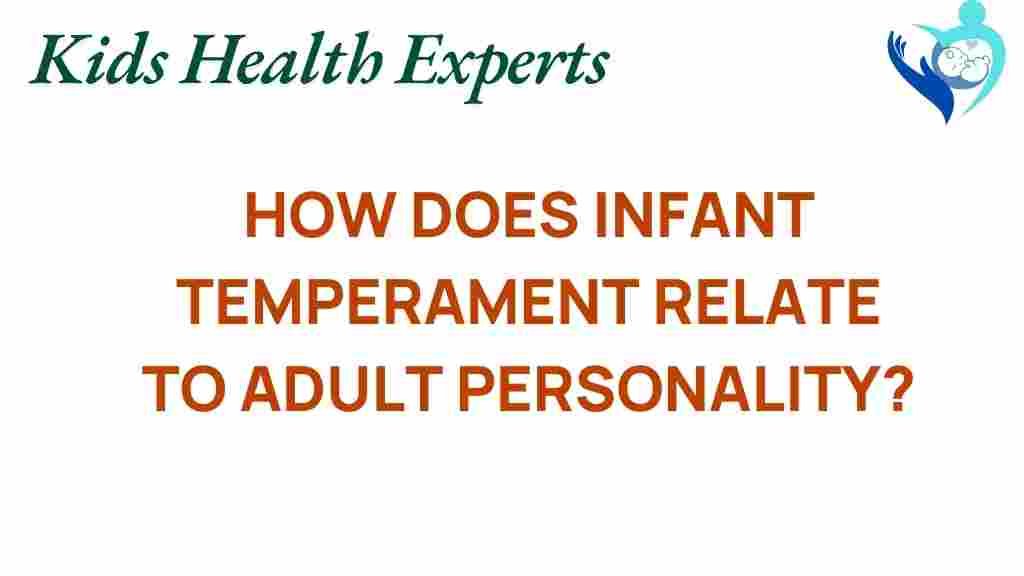Unraveling the Connection: Infant Temperament and Adult Personality
Understanding the intricate relationship between infant temperament and adult personality has long fascinated psychologists, parents, and educators alike. From the moment a child enters the world, their unique temperament begins to shape not only their early behaviors but also their psychological development through various life stages. In this article, we will explore how early childhood experiences influence personality traits, the role of emotional intelligence, and the ongoing debate of nature vs. nurture.
The Basics of Infant Temperament
Infant temperament refers to the innate characteristics that govern how a baby interacts with their environment and expresses emotions. These traits can be observed from a very young age and typically fall into several categories:
- Easy Temperament: Babies who are generally calm, adaptable, and regular in their routines.
- Difficult Temperament: Infants who are often fussy, irregular, and prone to intense reactions.
- Slow-to-warm-up Temperament: Children who are more reserved and take time to adjust to new situations.
These temperamental differences can be linked to various behavior patterns that persist into adulthood, influencing how individuals navigate social interactions, cope with stress, and express emotions.
The Link Between Temperament and Adult Personality
Research suggests that there is a significant connection between the traits observable in infancy and the personality traits exhibited in adulthood. For instance:
- Children with an easy temperament often develop into adults who are sociable and resilient.
- Difficult infants may face challenges with emotional regulation and could develop traits of anxiety or mood disorders later in life.
- Slow-to-warm-up children might become more introverted adults, preferring smaller social circles and familiar environments.
This correlation highlights the importance of understanding psychological development from a young age, as it can guide parents and caregivers in fostering positive growth.
How Early Childhood Shapes Personality
The foundation of adult personality is often laid during early childhood. The experiences and interactions infants have with their caregivers and surroundings play a crucial role in shaping their emotional and social development. Here are some critical aspects to consider:
Attachment Theory
Attachment theory posits that the bonds formed between infants and their caregivers significantly influence future relationships. Secure attachment often leads to healthier emotional regulation and social skills in adulthood, while insecure attachment can result in challenges such as:
- Difficulty in forming close relationships
- Increased anxiety
- Lower self-esteem
Parental Influence
Parents play a pivotal role in nurturing their child’s temperament. Supportive and responsive parenting can help mitigate the effects of a difficult temperament, while neglectful or overly critical parenting can exacerbate challenges. Key strategies for positive parenting include:
- Providing a stable and loving environment
- Encouraging exploration and independence
- Modeling emotional regulation and problem-solving skills
Environmental Factors
The environment in which a child grows up also contributes to their psychological development. Factors such as socioeconomic status, access to education, and community support can influence personality outcomes. For example, children from enriched environments often show higher levels of emotional intelligence, which is linked to better social interactions and coping mechanisms in adulthood.
The Nature vs. Nurture Debate
The interplay of genetic predispositions and environmental influences forms the crux of the nature vs. nurture debate. While genetic factors undoubtedly contribute to infant temperament, research shows that nurturing environments can significantly alter developmental trajectories, leading to varying behavior patterns in adulthood.
Understanding this balance is vital for parents and educators. While some children may be predisposed to certain traits, positive environmental factors can foster resilience and adaptability.
Emotional Intelligence: A Key Component
Emotional intelligence (EI) is a crucial aspect of personality that can be influenced by early experiences. EI encompasses the ability to recognize, understand, and manage one’s emotions, as well as the emotions of others. Children with high EI often exhibit:
- Better social skills
- Enhanced empathy
- Greater resilience in the face of challenges
Fostering emotional intelligence in infants can be achieved through:
- Modeling emotional expression
- Encouraging open discussions about feelings
- Providing opportunities for social interaction
Step-by-Step Process to Support Healthy Development
To promote healthy psychological development and positive personality traits in children, consider the following steps:
- Recognize Individual Temperament: Observe your child’s behaviors and preferences to understand their unique temperament.
- Create a Supportive Environment: Establish a nurturing and stable home where the child feels safe to express themselves.
- Encourage Exploration: Allow children to explore their interests and develop their identities through play and social interactions.
- Model Emotional Intelligence: Demonstrate healthy emotional responses and communication methods in everyday situations.
- Provide Consistent Feedback: Offer constructive feedback to help children learn from their experiences, reinforcing positive behaviors.
Troubleshooting Tips for Parents and Caregivers
Sometimes, despite best efforts, children may exhibit challenging behaviors related to their temperament. Here are some troubleshooting tips:
- Identify Triggers: Keep track of situations that lead to difficult behaviors and develop strategies to manage them.
- Stay Calm: Your emotional responses can influence your child’s behavior; practice self-regulation.
- Seek Professional Guidance: If challenges persist, consider consulting a child psychologist or counselor for tailored strategies.
Conclusion
Understanding the connection between infant temperament and adult personality is essential for fostering healthy psychological development. By recognizing the innate characteristics and providing supportive environments, parents can significantly influence their children’s future behavior patterns and emotional intelligence. The ongoing dialogue of nature vs. nurture continues to shape our understanding of personality, reminding us that every child is unique and deserves a nurturing approach tailored to their individual needs.
For further reading on this topic, you can explore the National Institute of Child Health and Human Development. Additionally, consider visiting this resource for more insights on emotional intelligence in children.
This article is in the category Mental and created by KidsHealthExperts Team
